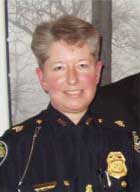-
- Massachusetts governor denies same-sex marriage training scheduled
- Atlanta hires its first full-time gay-crime specialist
- Gay teacher under fire for telling class he got married in SF
- Pelosi says she supports same-sex marriage, Newsom’s action
- State appeals court removes restrictions on gay father
- Same-sex marriage presents professional issues for journalists
- Court says woman can seek custody of children adopted by partner
- National News Briefs
- World News Briefs
national
Atlanta hires its first full-time gay-crime specialist
Lesbian officer vows to improve police relationship with GLBT community
Published Thursday, 01-Apr-2004 in issue 849
ATLANTA (AP) – Sgt. Connie Locke is working to find a killer.
She’s been canvassing local gay bars – Bulldogs, Metro, Model T’s, Mary’s, New Order and Backstreet – looking for anyone with clues in the death of Precious Armani, a pre-operative transgender woman.
Locke isn’t the lead investigator in the case, but this is the start of her work as the city’s first full-time police liaison to the gay, lesbian, bisexual and transgender communities. The new post is an attempt to change a history of distrust among a population of 400,000 that has made the Atlanta area the “Gay Mecca of the South”.
Armani’s killing Feb. 29 shocked Atlanta’s transgender community. Armani, whose legal name was Samuel Eugene Daily, was shot in the head while in the driver’s seat of a rental car parked outside a high-rise apartment building.
Fliers seeking information about the crime have been plastered around the city. They show a photo of Armani staring directly at the camera, her brassy hair teased and a black feather boa slung around her neck.
While the city’s gay and lesbian communities say they’ve had a strained relationship with police, Atlanta’s transgender residents – which had included Precious Armani – say their contact with officers has been nonexistent.
“We’ve been a target for many years, but it has been pushed under the rug,” said DeeDee Chamblee, executive director of the transgender support group La Gender. “We have hope that we would get the same amount of justice as everyone else.”
Chamblee was at a recent candlelight vigil for Armani. Locke, in her blue uniform, was there too.
“She’s dedicated,” said Chamblee, adding she is encouraged by Locke’s work and her presence.
A 15-year police veteran, Locke served part-time for a year as the department’s liaison before the job was made a full-time position in January. In addition to her police work, Locke, a lesbian, said that being a member of the community she serves helps her develop trust and credibility.
Locke is vowing that her work on the Armani murder case will be the prototype for how the Atlanta Police Department will handle all crimes involving gay, lesbian, bisexual and transgender residents.
She’s based her work on Washington D.C.’s Gay and Lesbian Liaison Unit, which now has 15 officers investigating crimes.
The D.C. unit’s commanding officer, Sgt. Brett Parson, said it was formed in 2000 after Washington reported suspiciously few hate crimes. He said the city’s officers had to be educated about hate crimes and work was done to improve the horrible relationship between the police department and the gay and lesbian community.
“The majority of the issues we deal with are everyday law enforcement issues. The difference is, in the past, gay people wouldn’t call the police,” Parson said. He added that his department still is working to gain the trust of the transgender and black gay and lesbian communities.
His officers work their beats by developing contacts and relationships. When a crime does happen that involves their community, his officers become “the ultimate support tool.”
Locke wants that in Atlanta.
Besides assisting on the Armani case, she has been working to change some of the department’s policies. Now, if it is thought a crime was committed as a direct result of the victim’s sexual orientation, the responding officer will immediately contact Locke. She will work with the officer to investigate the crime.
Locke is also working with the Atlanta Police Academy and will continue to teach her class – “Cultural Diversity II: Understanding the Gay Community and Hate/Bias Crimes” – to every recruit.
“There’s a lot of people who either haven’t had or don’t know they’ve had any contact with people in the [gay and lesbian] community,” Locke said of the recruits.
Locke’s boss, Atlanta Police Chief Richard Pennington, was Washington D.C.’s second gay and lesbian officer liaison in the late 1980s. When he went on to be New Orleans police chief in 1994, he started a liaison police program there.
Pennington has said he wants to ease the tensions between the gay and lesbian communities and police in Atlanta. That, of course, is a big job.
“Even though she is one person, she is not alone. She represents the tip of the iceberg among the good that is in that police department,” Parson said.
When asked if one officer was enough, Parson replied: “My opinion? She ain’t gonna sleep much. But it can be done.”
|
|
Copyright © 2003-2025 Uptown Publications


